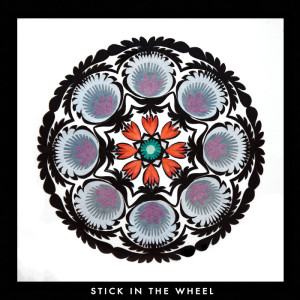 If I had known earlier about From Here, Stick in the Wheel’s debut full-length release, it probably would have earned a spot on my 2015 Top 10 list. As it is, it’s still one of my favorite albums from the past year from a new band that I hope to follow for a good long time.
If I had known earlier about From Here, Stick in the Wheel’s debut full-length release, it probably would have earned a spot on my 2015 Top 10 list. As it is, it’s still one of my favorite albums from the past year from a new band that I hope to follow for a good long time.
Stick in the Wheel are Cockney East London folk musicians with more than a whiff of the punk about them. And by “punk” I mean the DIY spirit and spit-in-your-eye attitude behind punk. The title of this release, which follows a handful of EPs and a 7-inch vinyl single, is a declaration of pride and intent. Pride in their roots and intent to make and sing their music in a way that reflects their place and heritage. “We see this music as part of our culture and we’re not pretending to be chimney sweeps or 17th century dandies,” says Nicola Kearey, who fronts the band with her in-your-face vocals. There’s no cleaning up of the lyrics or BBC-style gentrifying of their accents, which sometimes render the words nearly unintelligible to this stateside listener.
But that’s OK because the spirit shines through on every single one of these 14 tracks, recorded in Essex warehouses and the Eastside kitchens where these musicians live. They’re stripped-down, aggressive and raw sounding, from Kearey’s vocals to the arrangements that feature but a few acoustic instruments – guitar, mandolin, fiddle, maybe some bouzouki, and occasional percussion.
You’d recognize some of the folk standards here, even if they’re under different titles or varying arrangements. “Seven Gypsies” is a fully fleshed-out version of a common tale of the gentlewoman who leaves her husband, land, bed and babies to travel the road with a wild companion or, in this case, seven of them. You might know it as “Raggle-Taggle Gypsy” or “Gypsy Davy” or “Black Jack Davy” or many other titles. “There were seven of the Gypsies and all in a row / and none of them were lame or lazy-o / and they sang so sweet and so complete / that they stole the ‘eart of the lady-o,” Kearey sings in a surprisingly sweet soprano over a plucked mandolin. It’s a far cry from her more strident vocal on “Bows Of London,” a call-and-response arrangement of a song that crossed the water and is now known as “The Wind and Rain” in Appalachia. It features two sisters, a murder, and a fiddle made of body parts. Sings Kearey over a percussively strummed guitar: “There were two little sisters a-walkin’ alone (hey, hey the grindin’) / two little sisters a-walkin’ alone by the bonny bonny bows of London. And the eldest pushed her sister in (hey, hey the grindin’) / pushed her sister into the stream by the bonny bonny bows of London …” Kick-drum, hand-claps and other percussion, haunting fiddle lines and harmony vocals flesh this one out nicely.
Other traditional songs sung in all their Cockney glory include “The Blacksmith,” from Ralph Vaughan Williams’ collections; “The Jail Song,” which has been recorded by the likes of Steeleye Span, Martin Carthy and others as “The Gaol Song” or “The Treadmill Song” – the Sticks do this with a rock beat and sing the chorus as the very effective “with a whippin’ a day, whippin’ a day …” The song “Bedlam,” also known as “Bedlam Boys,” is accompanied by a very aggressively finger-picked resonator guitar. The Copper Family’s “Hard Times” is all the more sad and tragic for the slight lilt of hopefulness in Kearney’s voice on the final chorus. The opening track, Ewan MacColl’s “Champion” sounds like it could’ve been ripped from this week’s headlines on either side of the pond.
Here’s a performance of “Bedlam.”
The originals for the most part stick with the same ethos but with modern touches in the lyrics. “Common Ground” is a lament for the loss of commons to industry, pollution and climate change; in “My Barra” we encounter petty thieves who work what’s called the flea markets in the U.S.; the title characters in “Me ‘n’ Becky” join in the looting of a “retail park” of flat-screen TVs and Blackberrys, to a stutter-step tune that sounds to me as though it’s influenced by king punk Mike Watt. Things turn even darker and more experimental toward album’s end, particularly with the eerie ballad “By Of River,” which seems to be set at an execution, or perhaps during what we now call an ethnic cleansing. It offers the album’s title in its lyrics: “We come from here, from here are we / are of the earth, and of these we / lie you there, ready for your end / and by of river go we.”
From Here has received critical acclaim in the U.K. but seems mostly under the radar here in the U.S. I hope that changes, because I’d like to see them tour these parts. In the meantime, I can’t recommend this album highly enough.
Stick in the Wheel has a website and is on Facebook.
(Proper Music, 2015)
